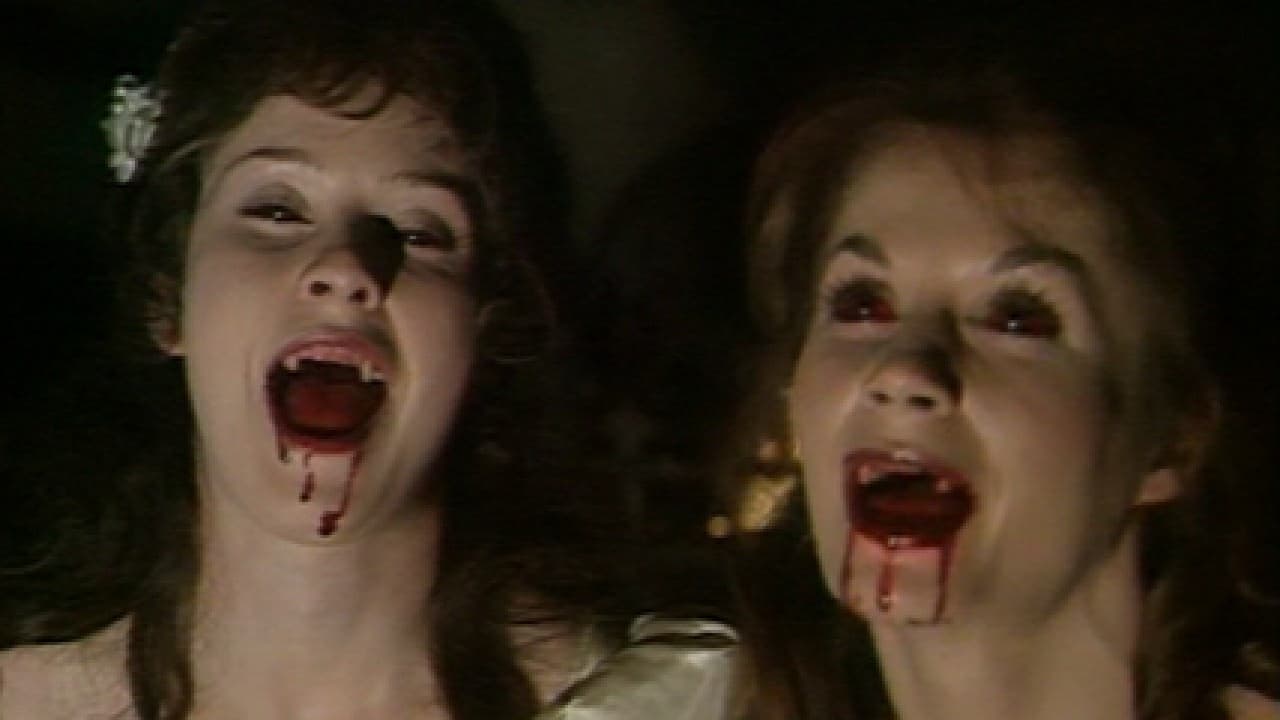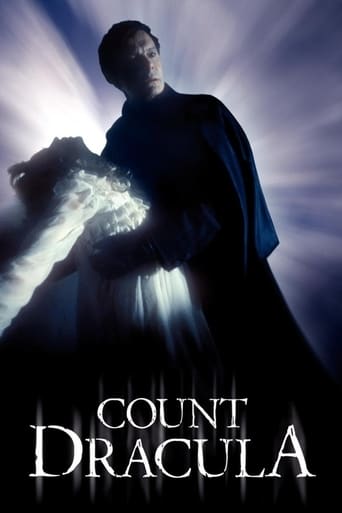

Plot so thin, it passes unnoticed.
... View MoreDreadfully Boring
... View Moren my opinion it was a great movie with some interesting elements, even though having some plot holes and the ending probably was just too messy and crammed together, but still fun to watch and not your casual movie that is similar to all other ones.
... View MoreI gave this film a 9 out of 10, because it was exactly what I expected it to be.
... View MoreLouis Jourdan as Dracula is fine to me, I have no problem with him as the Count. I really don't have a problem with most all of the other actors either - pretty much everyone was fine in the film.What I dislike about it is that it's rather drab and dry - it has no pizazz to it. The only pizazz we have is a psychedelic red and orange film with some black & white footage when something happens and I don't think that Bram Stoker would have liked or approved of the psychedelic parts of the film nor do I believe that is what he had in mind. What were they thinking? And the rest of the film is very dull.My childhood memories of this film were "it's quite good" until I saw it again recently and now I've changed my mind. I guess just seeing Dracula and the psychedelic colors were enough for me as a kid but not anymore.3/10
... View MoreThis 1977 BBC miniseries, written by Gerald Savory and starring Lois Jourdan, is indeed most faithful version of Bram Stoker's 1897 novel. However, the excellent story is told with all the anemic dullness of BBC Jane Austen adaptation. Sets, costumes and photography are dull and despite small budget, this lacks even camp charm - just like Judi Bowker's pale Mina , everything is decent but lifeless. 1992 version told the story with sumptuous imagery of Victorian and Gothic and (no pun intended) full-blooded life, so did Hammer's 1958 masterpiece, 1979 version was stylish and fun, and both Universals 1931 classics, English and Spanish, had atmospheric beauty. This pales in comparison to all of them.
... View MoreI have a comment for Author: kriitikko from Kirkkonummi, Finland. I will first use his comments and then respond."Ironically, the only performance not so faithful to Stoker, comes from Louis Jourdan as Dracula. This however is not a bad thing. Instead of copying Bela Lugosi or Christopher Lee, or playing Dracula more faithfully as a furious warlord (which Jack Palance had done few years earlier in another TV adaptation), Jourdan plays Dracula as calm, calculating demon who seduces his victims by offering them power and eternal life, but who is just coldly using them for his own advantages. In fact Jourdan portraits Dracula as a sort of Anti-Christ creature, who is looking for disciples and going against God. In one of the scenes Van Helsing raises his cross against Dracula and starts to enchant a prayer in Latin, only to receive an arrogant comment from the Count of how prayer always sounds more convincing in Latin. Jourdan may not be most faithful Dracula, but certainly one of the best, making Dracula seem far superior to humans." You are exactly correct. In the novel, Van Helsing states that because Dracula has what he attributes to a be mere "child's mind", that he is "slow to make haste". He uses the Latin term: Festina Lente, which means Hasten slowly or as Van Helsing puts it, "slow to make haste".This however proves to be Dracula's ultimate downfall.Though Van Helsing also warned Jonathan that "if he (Dracula) dared to use his full array of his powers, he would have been long beyond our (meaning the vampire hunters) reach".Thus proving his point. And Dracula's arrogance about believing himself to be vastly superior to mere mortals. He thought himself to be so superior, that in the end they finally defeated him. Because he failed to prepare for the fact that humans in the late 19th Century were better able to combat him, than human contemporaries of his 15th Century.
... View MoreI have a problem with the classic horror story "Dracula". It is, without a doubt, one of the best researched horror stories of all time - everything we generally know about vampires comes out of it's pages, because Abraham "Bram" Stoker spent years researching it before it was written and published in 1897. Stoker was actually a part-time novelist, and worked usually as theater manager for the great Sir Henry Irving and Ellen Terry. This explains the paucity of his number of total novels (roughly seven) in a thirty year career ending before his death in 1912. That said, my problem is that his strengths as a constructor of plots and of researching an arcane area of occult knowledge are not matched by a serious key to being a novelist: being readable. Of the major occult novelists, only the American Charles Brockden Brown can create such lugubrious prose (but to be fair, every now and then both Stoker and Brown let down their halting prose styles and relax enough to write something truly haunting in terms of dialog).Because of his weakness I only half enjoyed Dracula the novel. I was thrilled by the circumstances he set up in his tale of the blood - driven Transylvanian Count, but I hated reading his dialog because his characters are so stiff. Therefore, when others are critical of what is cut out of some of the film transitions of his stories (such as the classic 1931 Bela Lugosi film, based on the play Lugosi starred in) I find that the cuts are welcome as enlivening the work for the screen.Lugosi's performance has been called one of the great "operatic" performances captured on celluloid. That is Lugosi captured the grandeur of his twisted nobleman with that impeccable old pedigree - he made that cape of his seem as natural as the wind. It remains a great performance, even as we realize it is has become a source of jokes and spoofs (best seen in Mel Brooks/Leslie Nielson's "Dracula: Dead And Loving It").But for my money, the best performance of the role was done in this 1977 British production (shown that year on Masterpiece Theater) that starred Louis Jourdan in the title part. For the first time the role was not just purposely making the Count sinister and grand but good looking as well. Jourdan, impeccably suave and handsome, looked like he could charm a woman into a fatal tryst with him. In a way this production mirrored the nearly contemporary Broadway revival of the old play that starred a young, good looking Frank Langella as a sexy Count.The story was better told than the movie versions - they included the subplot about the American Quincy Morris (Richard Barnes) who is a rival of Jonathan Harker (Bosco Hogan) for Lucy Westenra (Susan Penheligon), and while Morris's character was combined with another minor figure it retained it's importance, as well as it's sad fate (at the conclusion Dracula is able to kill Morris before he is destroyed). On the other hand, the script writers got rid of one annoyance in the Stoker version: Morris is supposed to be an American from Texas - he sounds like he never was within two thousand miles of Texas.Jourdan did some nice tricks with the aid of the director, including one thing that was not done in any of Lugosi's: he is seen at one point climbing the wall of his castle to come into the window of Renfield's (Jack Sheppard's) room. Done slowly (Jourdan is heard creeping before he appears on the wall) it was a genuinely unsettling moment, especially as Jourdan is shot from the head down. The beast-nature of the Count was never quite shown that way before. As his opponent, Abraham Van Helsing, Frank Finlay gave a good account of that master skeptic - skeptical of dismissing "old wives tales" because there may be some truth to them. His handling of the unfortunately necessary destruction of Mina Westenra's (Judy Bowker's) Vampire infected corpse was far more realistic than the versions in Lugosi's film involving Edward Van Sloan in that same role. Mina is aware here of what Van Helsing is doing, and part of her senses it has to be done to free her soul.It has not been seen for decades, and hopefully still exists to be viewed again. If I only give it a "9" it is due to my problems with that novel as a novel, not with this series.
... View More